The history of Athens is the history of Western civilization, its origins and its very essence. Everything was invented here: democracy, theater, the foundations of law, philosophy and oratory. The city has been standing on the fertile land of Attica for 9 thousand years, no cataclysms and wars could shake its foundations.
In the ancient heart of Athens - the sacred Acropolis, there are still pagan temples dedicated to the mighty Zeus, the wise Athena and the mighty Hephaestus. Stone stages of ancient theaters still remember the first tragedies of Euripides. The marble steps of the Panathinaikos Stadium are still ready to receive dexterous athletes today.
For thousands of years, Athens flourished, fell into decay, were devastated and revived again. But the city was able to maintain its status as the progenitor and source in which our entire culture was born.
What to see and where to go in Athens?
The most interesting and beautiful places for walking. Photos and a short description.
- Athenian acropolis
- Parthenon
- Temple of Hephaestus
- Erechtheion
- Odeon of Herodes Atticus
- Temple of Olympian Zeus
- Tower of the Winds
- Theater of Dionysus
- Kerameikos
- Standing Attala
- Panathinaikos Stadium
- New Acropolis Museum
- Benaki Museum
- National Archaeological Museum
- Museum of Cycladic Art
- Byzantine Museum
- Cruiser Georgios Averof
- Athens Academy of Sciences
- Syntagma Square
- Guard of honor at the Tomb of the Unknown Soldier
- Church of Panagia Kapnikareya
- Monastery of Daphni
- Lycabettus
- Areopagus
- Hill of Muses
- Plaka
- Monastiraki
- Anafiotika
- National garden
- Flisvos Marina
athenian acropolis
The Acropolis is the heart of Athens, the ancient city where civilization was born thousands of years ago, which gave rise to the entire modern Western world. The architectural ensemble of the Acropolis includes buildings of the pre-Hellenistic, Hellenistic, Roman, Byzantine and Ottoman periods in the history of Athens. Of greatest interest are the partially preserved walls and columns of ancient temples and theaters. The Acropolis of Athens is one of the most valuable objects of the cultural heritage of mankind.
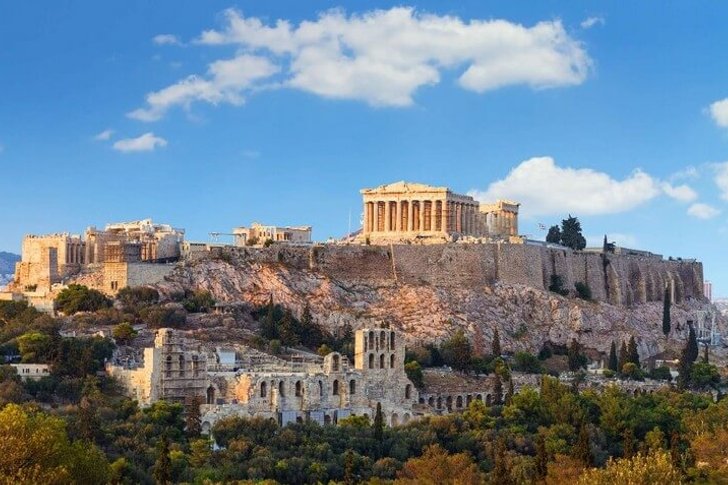
Address: Acropolis of Athens, Athens, Greece
Phone: +30 21 0321 4172
Opening hours: 08:00 - 19:00
Parthenon
Greek temple dedicated to the patroness of the city - the goddess Athena. The majestic building was built in the 5th century BC. during the heyday of the city of Athens under the ruler Pericles. The names of the architects of the temple have survived to this day. It is believed that the masters Kallikrat and Iktin worked on the construction, and the great Phidias worked on the sculptural design. The interior decoration of the Parthenon was pompous and pompous, and the facade was painted in different colors.
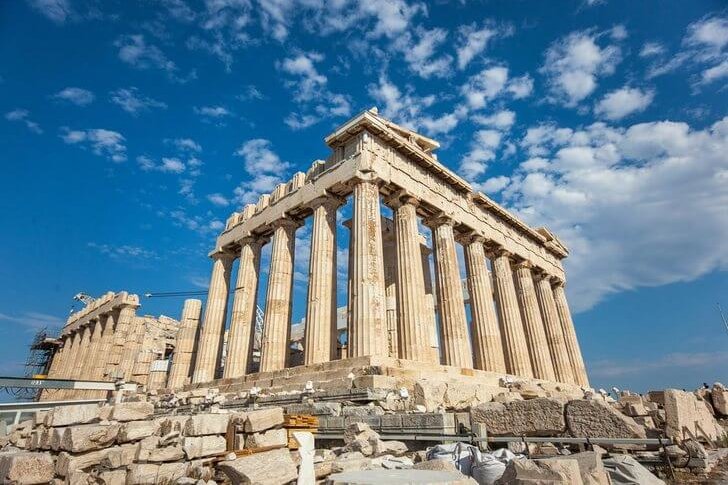
Address: Parthenon, Athens, Greece
Opening hours: 08:00 - 19:00
Temple of Hephaestus
Temple of the 5th century BC, belonging to the Classical era of Greek history. It was erected at the behest of the Athenian ruler Pericles, an outstanding commander and talented politician. The roof of the building is fortified on orderly rows of Doric marble columns, the friezes are made in compliance with the canons of the Ionic style. Interestingly, from the 7th century AD. and until the beginning of the 19th century, the Orthodox Church of St. George was located in the temple of Hephaestus.
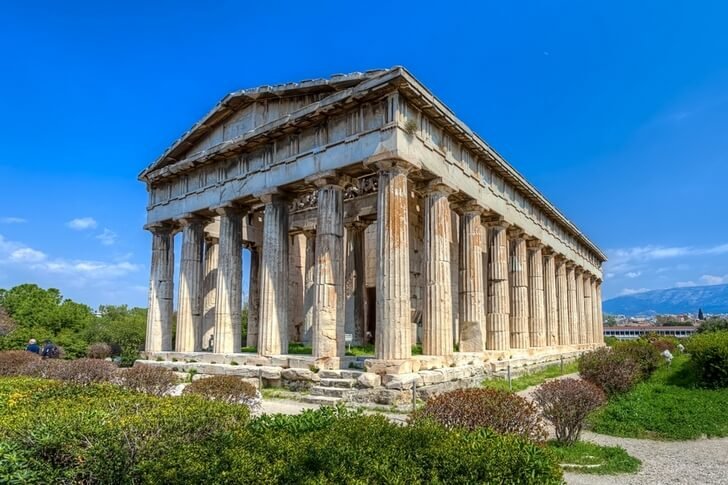
Address: Temple of Hephaestus, Athens, Greece
Opening hours: 08:00 - 19:00
Erechtheion
According to ancient legend, the Erechtheion was built on the site of a dispute between Athena and Poseidon, during which the gods did not share power over Attica. The temple was erected at the end of the 5th century BC. in the Ionic style, the name of the architect was lost in the thickness of the centuries. The well-preserved portico of the Caryatids, which was added to the temple later. It is a series of female sculptures-columns supporting the roof. Authorship is attributed to the sculptor Callimachus (according to another version - Alkamen).
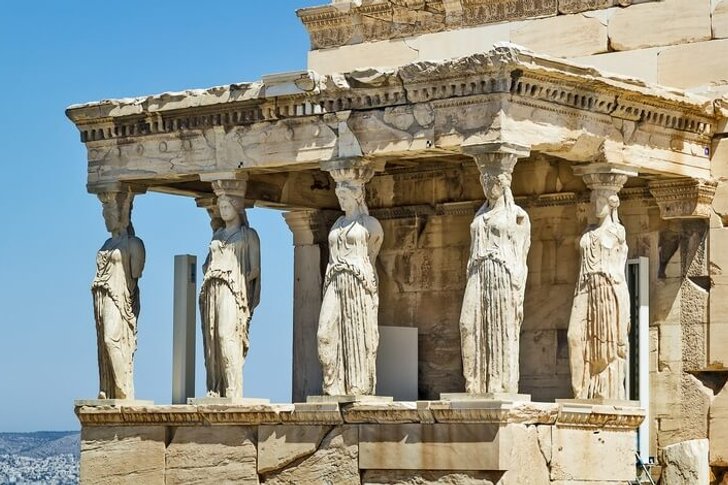
Address: Erechtheion, Athens, Greece
Phone: +30 21 0321 4172
Opening hours: 08:00 - 19:00
Odeon of Herodes Atticus
Stone theater, located on the southern slopes of the Acropolis. The Odeon was erected in the middle of the 2nd century BC. It was used to organize theatrical performances and musical performances. The Odeon is perfectly preserved and moreover, it is used for its intended purpose in our days. After reconstruction in the middle of the 20th century, the stage began to host the annual Athens Festival. Over the past time, the best voices of the world stage performed at it.
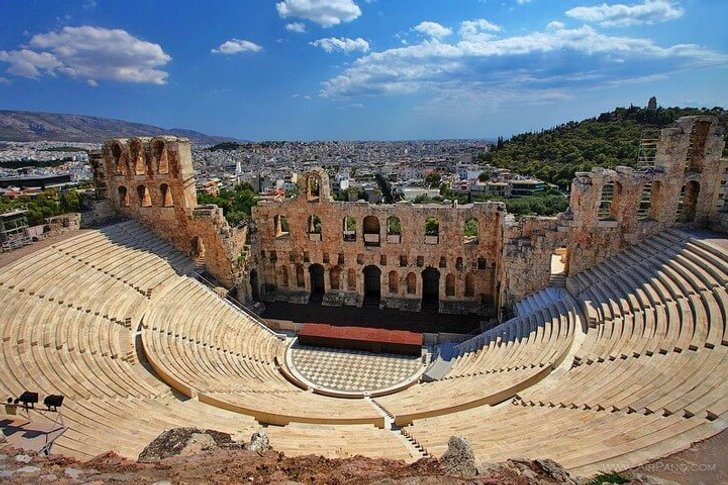
Address: Odeon of Herodes Atticus, Athens, Greece
Opening hours: 08:00 - 19:00
Temple of Olympian Zeus
The grandiose construction of the temple began in the 6th century BC. under the tyrant Pisistratus, but after his overthrow the building stood unfinished for another six centuries. The work was completed under the Roman Emperor Hadrian. In the III century AD. during the sack of Athens, the temple was seriously damaged, and in the 5th century it was completely closed by order of Theodosius II. The final destruction of the temple of Olympian Zeus occurred with the decline of the Byzantine Empire. The remains of the building were discovered during excavations of the 19th century.
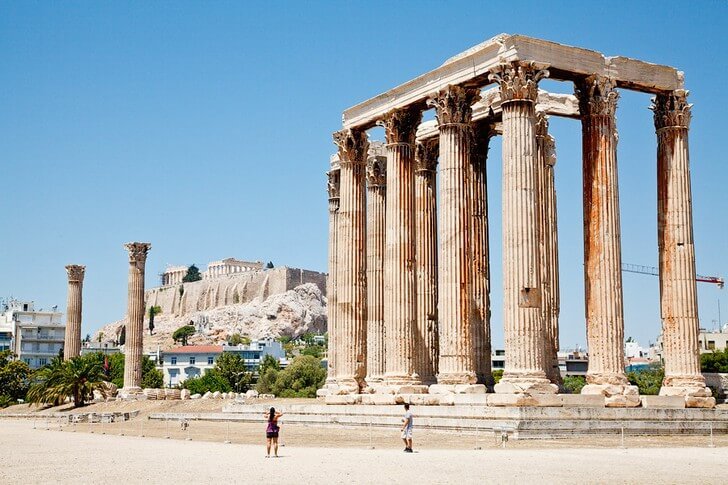
Address: Temple of Olympian Zeus, Athens, Greece
Opening hours: 08:00 - 19:00
Tower of the Winds
An octagonal building made of Pentelicon marble, located on the territory of the Roman Agora. According to one version, it is believed that the tower was built in the 1st century BC. astronomer Andronicus of Kirr. The structure reaches a height of 12 meters, a width of about 8 meters. In ancient times, a weather vane was installed on the top, which indicated where the wind was blowing. The walls of the tower are decorated with images of eight Greek deities who are responsible for the direction of the wind.
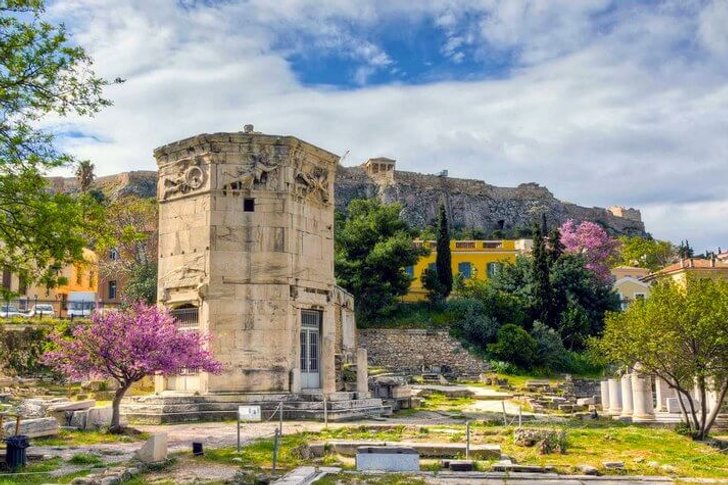
Address: Tower of the Winds, Athens, Greece
Phone: +30 210 324 4703
Opening hours: 08:00 - 15:00
Theater of Dionysus
The theater is located in the southeastern part of the Acropolis, it was built in the 5th century BC, and is the oldest theater in Athens. The works of Euripides, Aristophanes, Sophocles and Aeschylus were staged on the stage. In the 1st century BC. under the emperor Nero, a large-scale reconstruction of the theater was carried out. The scene fell into disrepair by the 4th century AD. and was gradually abandoned. Today, a large-scale theater restoration project is being carried out.
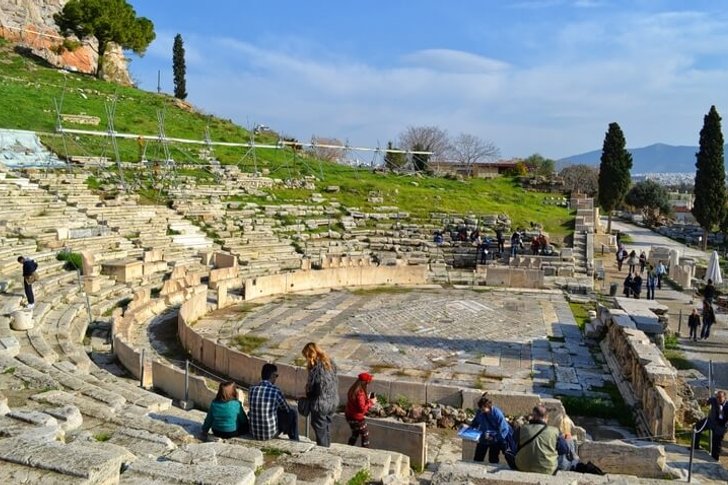
Address: Theatre of Dionysus, Athens, Greece
Phone: +30 210 321 0190
Opening hours: 08:00 - 19:00
Kerameikos
The ancient city cemetery, where the most worthy representatives of Athens were buried until the 4th century. This place has been used as a necropolis since the Bronze Age. Famous military leaders, statesmen and philosophers are buried here, including Pericles, Cleisthenes, Solon, Chrysippus and Zeno. There are many tombstones of the Antique period, tombstone columns and sculptures in the cemetery.
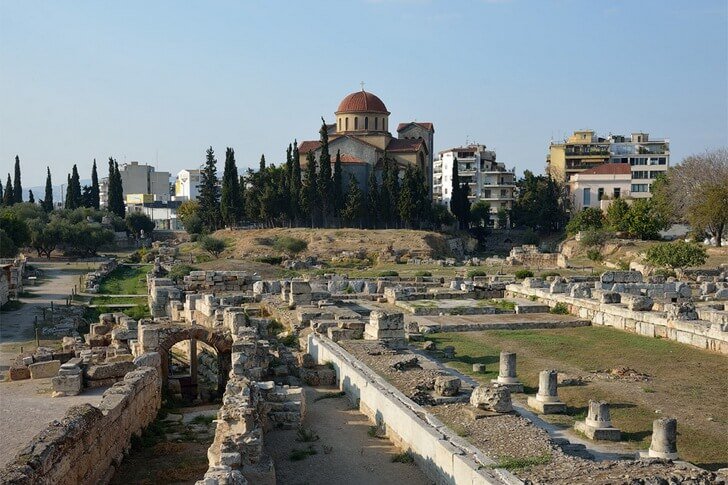
Address: Kerameikos, Athens, Greece
Opening hours: 08:00 - 19:00
Standing Attala
Covered two-story colonnade, built in the 2nd century BC. The construction was commissioned by the Pergamum king Atallus, who in his youth was trained in Athens (for the young descendants of the royal families of the Mediterranean, this was a common practice at that time). In ancient times, standing served as a place for the townspeople to walk. From here it was possible to observe the square and streets of Athens, as well as various festive processions.
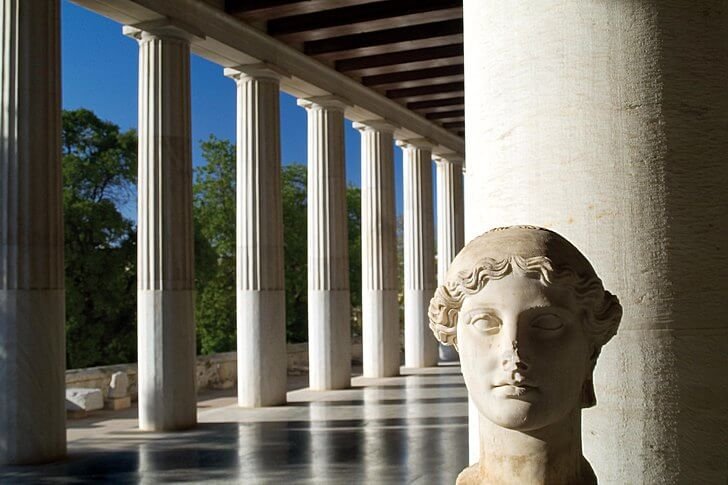
Address: Stoa of Attalos, Athens, Greece
Opening hours: 08:00 - 19:00
Panathinaikos Stadium
An ancient stadium made entirely of Pentelicon marble. On its territory, the Panathenaic Games were held - a great sports and religious festival, where athletes performed, festive processions took place and ritual sacrifices were made. At the end of the 19th century, the revived Olympic Games were held at the Panathinaikos Stadium.
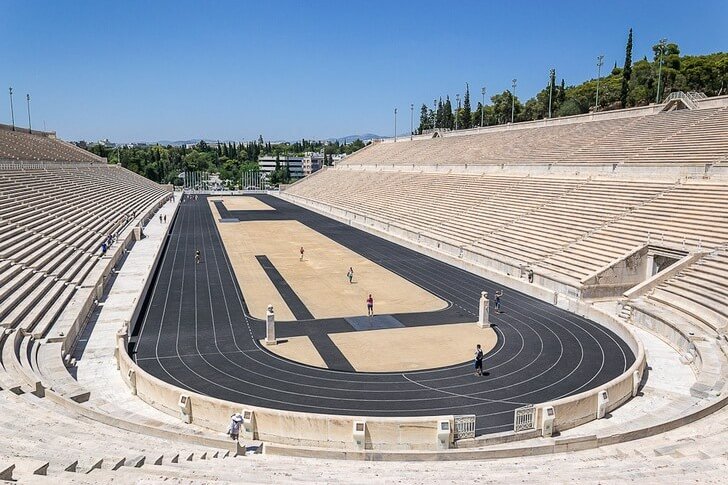
Address: Panathenaic Stadium, Athens, Greece
Phone: +30 210 9220515
Opening hours: 08:00 - 19:00
New Acropolis Museum
The modern building of the museum was created in 2009 according to a joint project of Greek and Swiss specialists. The collection is made up of artifacts belonging to different periods of the history of Athens. Mainly, the funds were replenished due to archaeological excavations on the territory of the Acropolis. The new Acropolis Museum became the heir to the old collection of antiquities, which had existed since the middle of the 19th century.
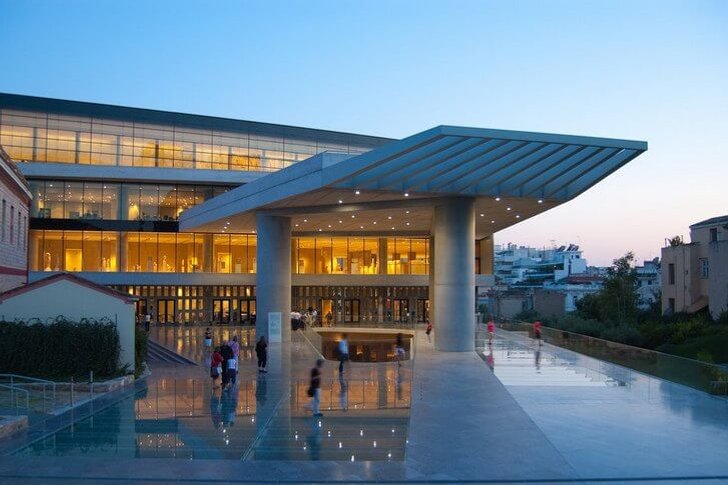
Address: Acropolis Museum, Athens, Greece
Phone: +30 210 9000900
Opening hours: 08:00 - 20:00
Benaki Museum
Private collection, which was founded in 1930 by A. Benakis on the territory of his family mansion. The owner collected the collection for 35 years and handed it over to the state. Antonis himself served as head of the museum until his death. The exposition consists of works of Greek art. Ceramics, textiles, engravings, sculptures, jewelry and church utensils are exhibited here. Also in the museum there are several paintings by El Greco.
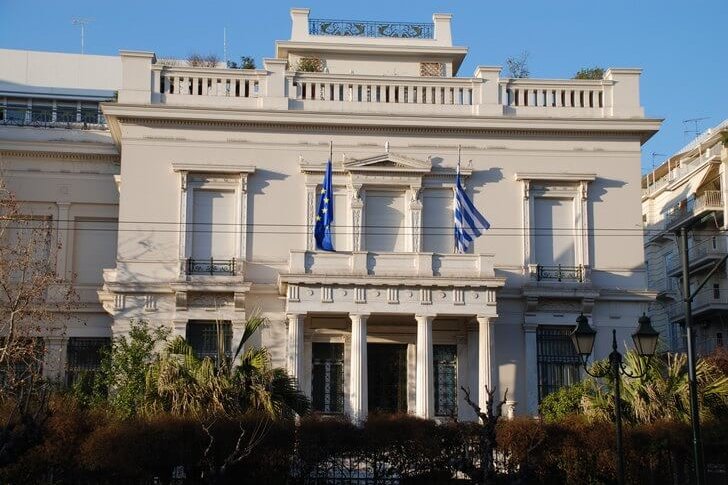
Address: Benaki Museum, Athens, Greece
Phone: +30 210 3671000
Opening hours: 10:00 - 18:00
National Archaeological Museum
The museum is the largest collection of objects of ancient Greek culture. The archaeological collection was founded at the beginning of the 19th century; in 1889, a separate neoclassical building was erected for it. The museum exposition is divided into several collections, which include collections of the prehistoric period, Cycladic art, Mycenaean art, Egyptian art and many others.
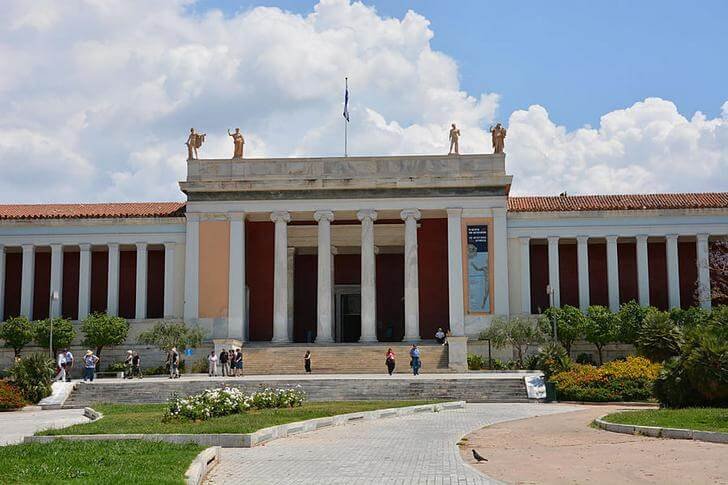
Address: National Archaeological Museum, Athens, Greece
Phone: +30 213 214 4800
Opening hours: 08:00 - 20:00
Museum of Cycladic Art
The exposition was founded in 1986 on the basis of a frequent collection of the influential Greek Goulandris family. Before the transfer of the collection to the hands of the state, it visited many world exhibitions. The museum building was designed by V. Ioannis. The collection is divided into three parts: Bronze Age, Ancient Greek Art, Art of Ancient Cyprus. It should be noted that the museum contains the most complete collection of artifacts of Cypriot culture.
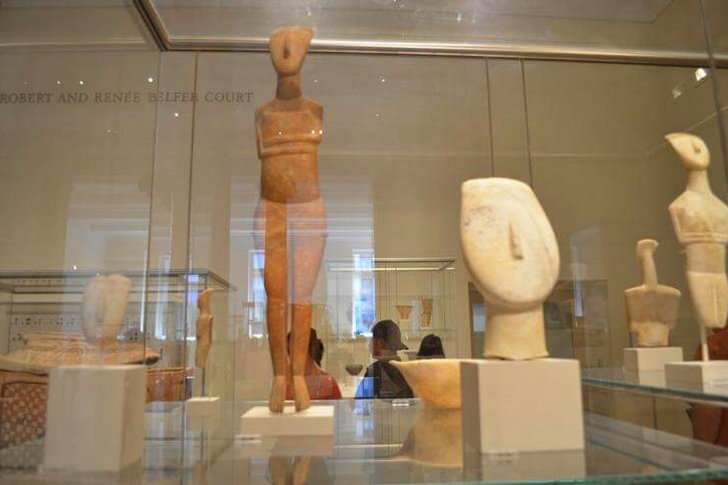
Address: Museum of Cycladic Art, Athens, Greece
Phone: +30 210 7228321
Opening hours: 10:00 - 18:00
Byzantine Museum
The museum has a collection of Byzantine and post-Byzantine art spanning 15 centuries. An impressive collection of valuable icons is kept here. The museum was opened in 1914, in 1930 it moved to the former villa of the Duchess of Piacenza. In addition to icons, the museum funds contain statues, church vestments, ceramics, engravings, manuscripts, mosaics, dishes and much more.
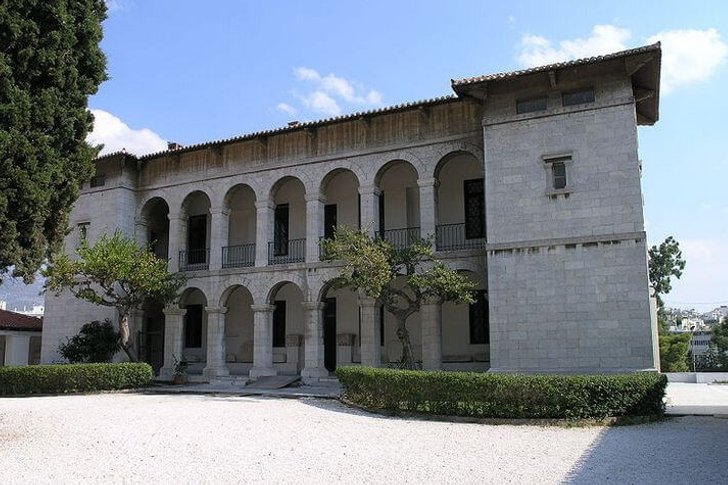
Address: Byzantine and Christian Museum, Athens, Greece
Phone: +30 210 7211027
Opening hours: 08:00 - 15:00
Cruiser Georgios Averof
The ship-museum, moored to the eternal parking lot in the harbor of Palio Faliro. The ship was built at the beginning of the 20th century in Livorno for the needs of the Italian army, but due to economic difficulties it was sold to Greece. The cruiser took part in the First Balkan War, during the First and Second World Wars, it was captured first by the French and then by the British. In the 50s. the ship was put into reserve. In 1984, it was decided to turn the ship into a museum.

Address: Battleship Averof, Athens, Greece
Phone: +30 210 5228494
Opening hours: 09:00 - 17:00
Athens Academy of Sciences
The Academy of Sciences is the main public research institution in Greece. The main building of the building in which it is located was designed by F. von Hansen in 1887. The building is a real masterpiece of neoclassical architectural style. In front of the facade there are sculptures of the thinkers Plato and Socrates, as well as statues of the ancient Greek gods - Athena and Apollo.
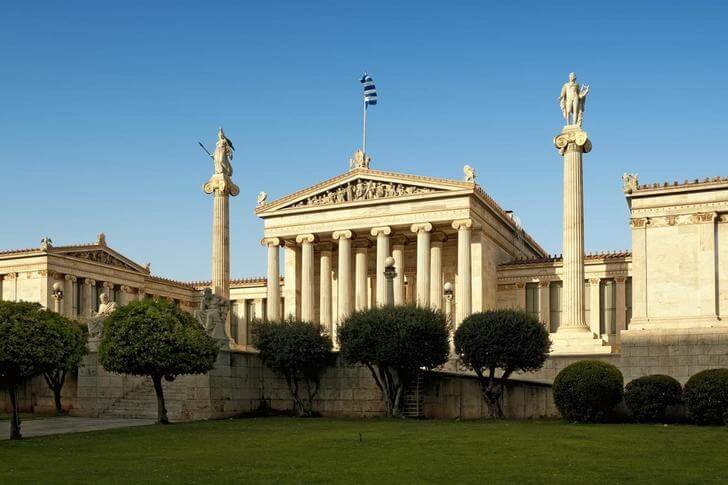
Address: Academy of Athens, Athens, Greece
Phone: +30 210 3689400
Opening hours: 09:00 - 15:00
Syntagma Square
The square is located in the modern center of Athens. The place gained importance in the 19th century, becoming the center of the commercial life of the city. On the square is the Royal Palace of the mid-19th century, built according to the project of F. von Gaertner. Now the Greek parliament sits there. Syntagma Square is constantly becoming the epicenter of public unrest. Protests, strikes and other mass actions of disobedience often take place here.
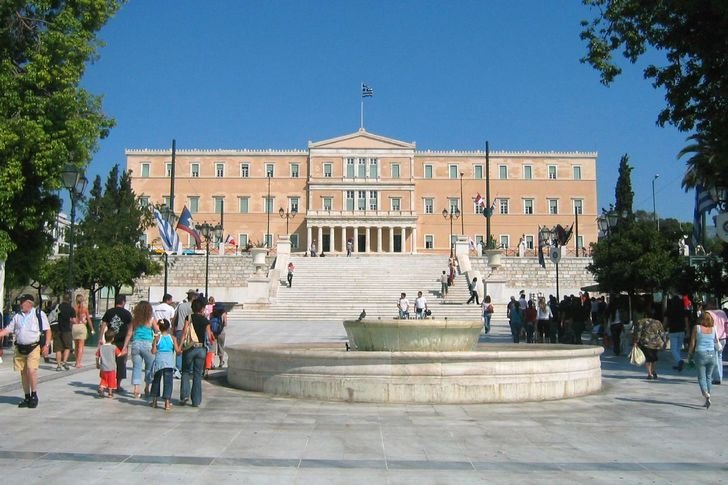
Address: Syntagma Square, Athens, Greece
Opening hours: 24/7
Guard of honor at the Tomb of the Unknown Soldier
The guard of honor is on duty at the walls of the Royal Palace on Syntagma Square. This is a rather unusual and even funny spectacle, unlike similar ceremonies in other countries. It's all about the unusual uniform of the Greek soldiers, which consists of tunics, skirts, white tights and slippers with pom-poms, as well as non-standard marching during the changing of the guard. This spectacle always attracts a large number of tourists.
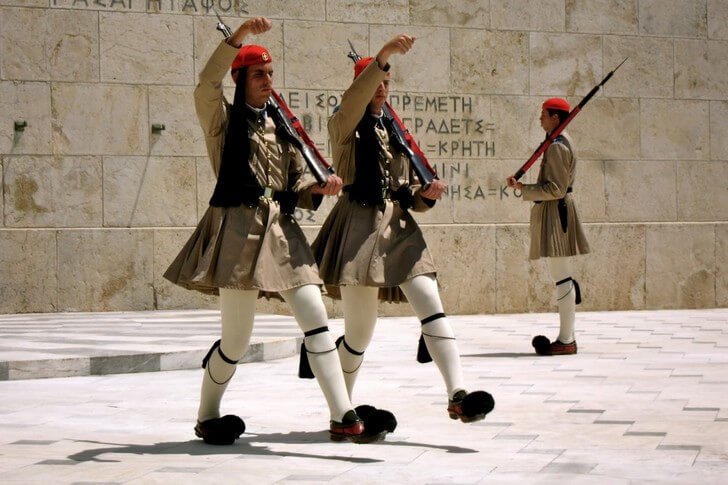
Address: Changing of the Guard at the Tomb of the Unknown Soldier, Athens, Greece
Phone: +30 210 32 73 133
Opening hours: 24/7
Church of Panagia Kapnikareya
One of the oldest Orthodox churches in Athens. The temple was erected on the ruins of a pagan sanctuary dedicated to a female deity. The first Christian churches began to appear in the city at the dawn of the Byzantine era, when the city fell into decay, and the new faith almost completely replaced the pagan cults. The Church of Panagia Kapnikareia is built in a typical Byzantine manner, characterized by round domed towers.

Address: Kapnikarea Church, Athens, Greece
Opening hours: 08:00 - 20:00
Monastery of Daphni
The monastery is located 11 km. from Athens next to the Daphne Grove. It was founded in the 6th century on the site of the ruined temple of Apollo and eventually became one of the most revered shrines in Greece. The original appearance of the monastery has practically not been preserved; a building of the 11th century, the heyday of the Byzantine Empire, has survived to this day. In the XIII century, Catholic monks settled in the monastery for a while, but in 1458 the entire complex of buildings was returned to the Orthodox Church.
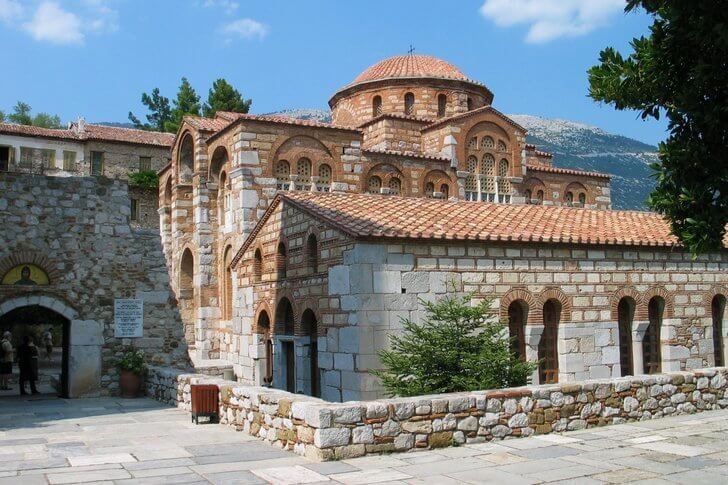
Address: Daphni Monastery, Athens, Greece
Phone: +30 210 5317141
Opening hours: 08:00 - 15:00
Lycabettus
A hill in the northeastern part of Athens, which is the highest point in the city. It offers panoramic views of the Acropolis and Piraeus port. The hill has two peaks, on one of them there is a church, on the other - a modern theater with an open stage. There are three ways to get to the top: climb the equipped pedestrian road, use the funicular or drive by car.
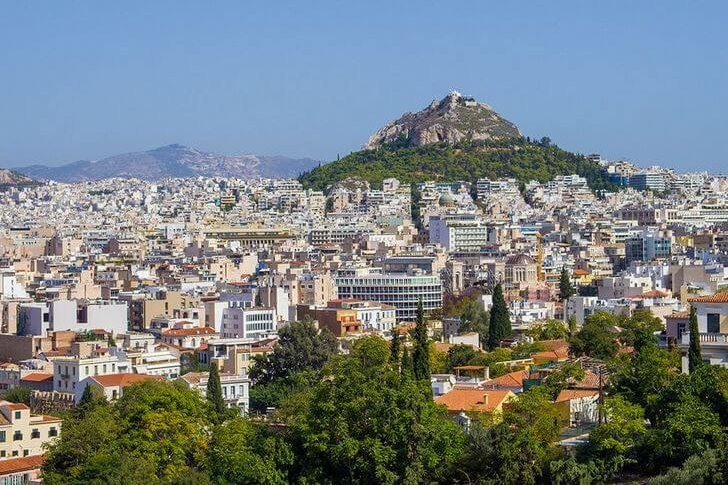
Address: Lykavittos Hill, Athens, Greece
Opening hours: 24/7
Areopagus
The hill on which the highest court of Athens, the Areopagus, met in ancient times. The name, apparently, comes from the name of the god of war Ares. Until the 5th century BC. The Areopagus served as the city council of elders, but from 462 BC. this body was deprived of political functions and empowered to administer civil and criminal courts. The apostle Paul also preached on the hill.
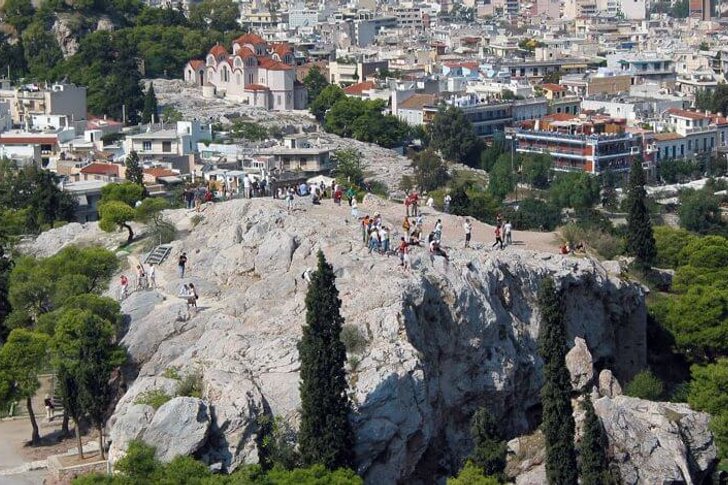
Address: Areopagus Hill, Athens, Greece
Opening hours: 24/7
Hill of Muses
City hill with a monument on top, erected in honor of the Roman Gaius Julius Philopappus, who more than once helped Athens with money. Since the 2nd century, the place has been better known as Philopappos Hill, previously it was named after the ancient Greek philosopher, poet and musician Musaios (translated as “Muses”). On the slopes of the hill there is a natural park without infrastructure.
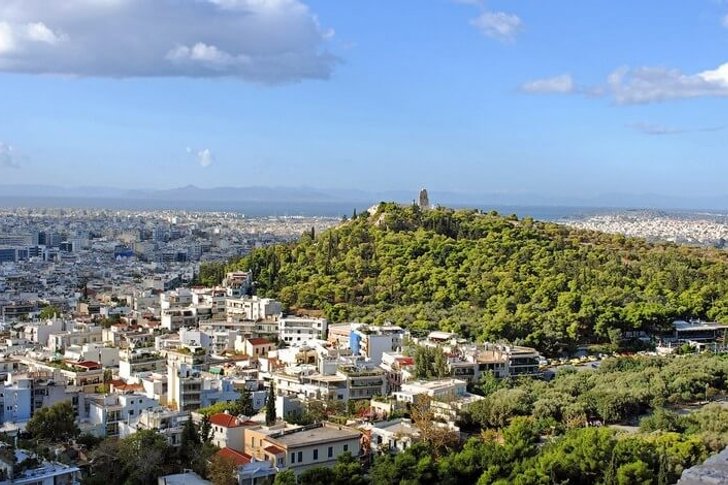
Address: Hill of the Muses, Athens, Greece
Opening hours: 24/7
Plaka
The old district of Athens, built up mainly with houses of the XVIII century. Almost all buildings stand on antique foundations. On the territory of Plaka there is the oldest street of the city, which has retained its direction since ancient Greece. A large number of former residential buildings have been converted into museums, souvenir shops and cafes, as residents moved en masse from Plaka in the 19th century.
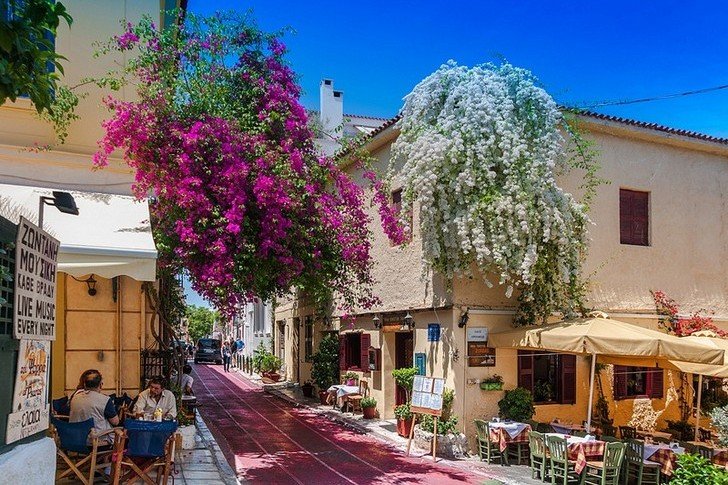
Address: Plaka, Athens, Greece
Opening hours: 24/7
Monastiraki
The city market, located in the district of the same name, is one of the most popular marketplaces in Athens. Monastiraki belongs to the category of flea markets. It sells a lot of unnecessary things, homemade shoes, antiques, coins, furniture and other collectible antiquities. In the market, you can look at the unique exposition of Greek life of the past centuries.
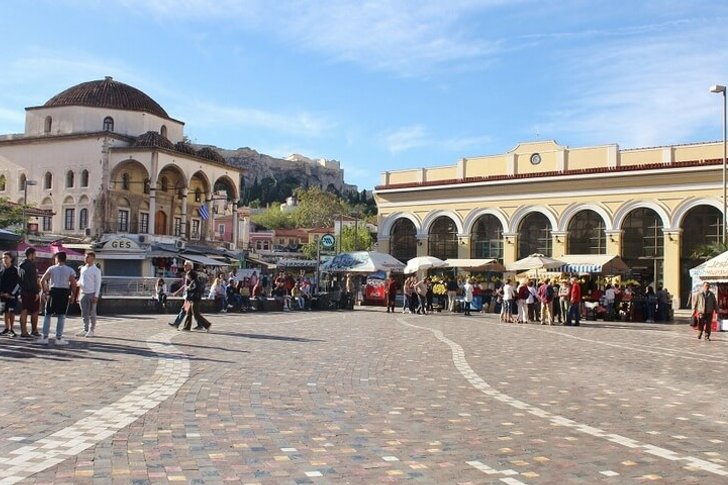
Address: Monastiraki, Athens, Greece
Opening hours: 24/7
Anafiotika
A unique quarter in the ancient area of Plaka, which is adjacent to the Acropolis. The winding and slightly crooked streets of Anafiotika are built up with typical white Mediterranean houses. The area was formed as a result of the resettlement of builders from the island of Anafi to Athens. They arrived in the capital on the call of the Greek king Otto in order to build a palace on his special order.
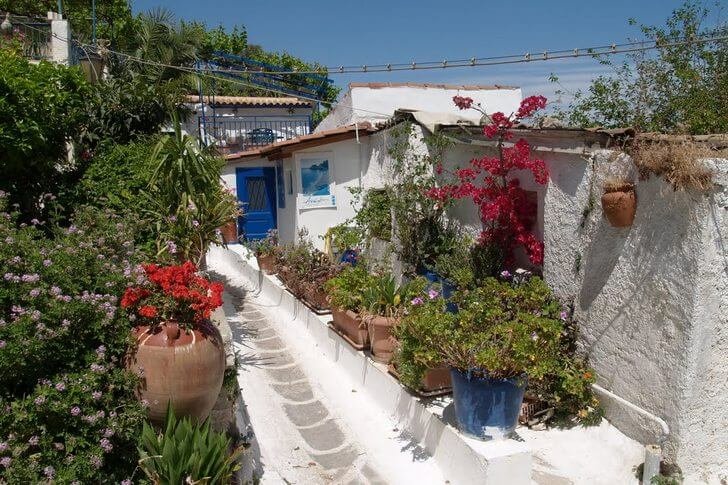
Address: Anafiotika, Athens, Greece
Opening hours: 24/7
national garden
A 16 hectare park located in the heart of Athens. Five hundred species of various plants grow on its territory. Every third tree is over 100 years old. Within the National Garden, ancient Greek ruins have been preserved - the remains of walls, columns and fragments of mosaics. The garden was created in the 19th century by the will of Queen Amalia. At first, vegetables and fruits for the royal cuisine were grown in it. Now the former garden has turned into a green oasis in the middle of a stone city.
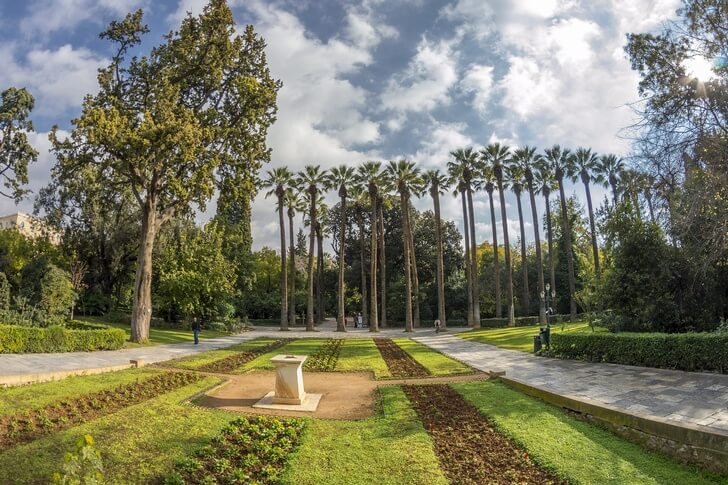
Address: National Garden, Athens, Greece
Phone: +30 210 723 1003
Opening hours: 07:00 - 19:00
Flisvos Marina
A modern berth for yachts, designed for the simultaneous parking of 200 ships. An excellent infrastructure for tourists has been created on the marina embankment: luxury boutiques, restaurants, a picturesque promenade. On the berths, you can admire luxury yachts flying the flags of different countries, as well as, if you wish, take a refreshing boat trip along the coast.

Address: Flisvos Marina, Athens, Greece
Phone: +30 210 9818255
Opening hours: 24/7
